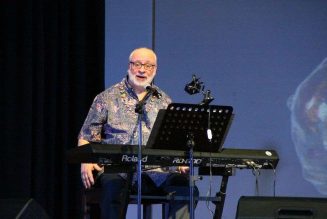
The Gospel reading is a plea for help from a world that longs for the Church this Sunday, the 11th Sunday in Ordinary Time, Year A.
You can tell the words are inspired by the Holy Spirit, because what St. Matthew wrote two millennia ago expresses precisely what is missing from parishes in America today.
In the Gospel, the Holy Spirit describes for Americans the people whose homes fill our parishes.
“At the sight of the crowds, Jesus’ heart was moved with pity for them because they were troubled and abandoned, like sheep without a shepherd,” it says.
Isn’t this a description of our own neighborhoods? All around us, people are suffering and even dying due to precisely the problems we have powerful answers to.
- Sex and personal identity issues are at crisis levels. STDs are at record highs. Girls are facing skyrocketing depression, with sexual pressure cited as a major cause. Young people who question their identity aren’t culture warriors but victims. But Catholics — in our institutions and in our homes — are doing little to promote the Church’s sexual teachings.
- Poverty is a major problem because of the breakdown of the family. Newspapers from San Antonio, Texas, to Richmond, Va., acknowledge that men who abandon their responsibility to women and children are the main reason behind the rise in poverty. Churches are materially generous to people in need, but we are less effective at sharing the Church’s teachings could make huge strides against generational poverty.
- Communities are fracturing, with social isolation on the rise. In 2022, the United States saw the highest rates of deaths of despair ever. Our neighbors are lonely and hurting and our parishes are not gathering them into Christ’s arms.
In short, record numbers of people are “troubled and abandoned, like sheep without a shepherd” at precisely the time when the Church in America has more than 17,000 parishes that could help, spread far and wide. Better: We have a highly educated laity who have been told by a Vatican Council that we are front-line troops in the battle for souls.
So why are we doing so little? The Gospel explains that, too.
“The harvest is abundant but the laborers are few; so ask the master of the harvest to send out laborers for the harvest,” Jesus says.
The potential labor force in our parishes is enormous. The active labor force is tiny. Whose fault is that?
It could be the parishes’ fault: The bureaucracy at parishes is often a muddle such that, far from being a force for spreading the faith to as many people as possible, many parishes are not even returning calls from the few people still seeking the sacraments.
It could be the lay peoples’ fault: The Catholic faith can’t thrive apart from a Catholic culture lived in our homes, and all of the markers that used to give people a Catholic culture — the Precepts of the Church, for starters — have been declining or absent for decades.
But ultimately, it doesn’t matter whose fault it is. What is more important is the remedy. And the remedy is to “ask the master of the harvest to send out laborers.” That means praying for vocations to the priesthood and religious life — and it also means praying for vocations to the active lay life.
Next, the Gospel gives a remedy that we still have: the successors of the Apostles.
“He summoned his twelve disciples and gave them authority over unclean spirits to drive them out and to cure every disease and illness,” says the Gospel.
He gives our bishops, the successors of the Apostles, the same abilities. They have the power of the sacraments, which accomplish in a definite way all the works Jesus lists. But in the Church’s moral and spiritual teaching, bishops are entrusted with what is needed to cure those sick from anxiety and addiction; raise those dead in sin to new life; cleanse those who feel unclean from sexual sin; and drive out the destructive demons that are driving people toward despair.
In this particular Gospel passage, which comes early in the story of Christ’s ministry, Jesus gives his apostles a focus: “Do not go into pagan territory or enter a Samaritan town. Go rather to the lost sheep of the house of Israel.”
That may not be bad advice for the bishops in our day, either: First, wake up your own people. Then march forth with an army at your side.
The rest of Sunday’s readings are key texts of Christian inspiration meant to get the blood flowing.
The First Reading describes how God has chosen and equipped us: “I bore you up on eagle wings and brought you here myself,” says the Lord in Exodus. “You shall be to me a kingdom of priests, a holy nation.”
“God proves his love for us in that while we were still sinners, Christ died for us,” says St. Paul in the Second Reading.
Who is it who wants us to be laborers in the harvest? Jesus Christ, God himself. He died for us, fed us with his body and blood, gathered us, transformed us, equipped us, and now commands us to be his ambassadors in our neighborhoods.
He gave the Church the precise answers we need for the precise problems our neighbors are facing.
- Regarding sex and personal identity, we have Church’s teaching on marriage on sexuality — a positive teaching that tells us who we are, and how to get the most out of life while avoiding the blind alleys that only end in heartache and pain.
- Regarding poverty and abandonment, we have the Church’s economic teaching, calling out the empty promises of Marxist materialism on the one hand and market consumerism on the other, and pointing to an economy of generosity.
- Regarding our fracturing communities, we have Catholic social teaching directing us to solidarity, love for all, and subsidiarity, effective action for local good.
These are the issues we are meant to take up, study, and champion in the New Evangelization.
Which leaves just one last line from Sunday’s Gospel.
The Gospel lists the names of the Apostles and Jesus tells them: “Go, make this proclamation: ‘The kingdom of heaven is at hand!’”
Think about that. He is speaking to a group of fishermen and other ordinary people. And Jesus trusts them to tell people that a better way is here at last.
St. Gregory the Dialogist, who lived in Italy after the fall of the Roman Empire, said we have a far easier job than the original apostles had. The twelve “were sent to preach the unseen kingdom of heaven at the very time when everyone far and wide could see the kingdoms of earth flourishing,” he said. “It is easy now, when we see everything heading for destruction.”
In 2023, it is increasingly obvious once again that the world is desperately in need of a new direction and a deeper sense of purpose. Think about your own story, and the stories of your circle of Catholic friends: Every one of them became disenchanted with the state of the world and has a testimonial of gratitude for the hope Jesus Christ offers.
It’s time to share those stories far and wide, and invite more people into the beautiful life of grace that we have found.
Image: Pxfuel.








